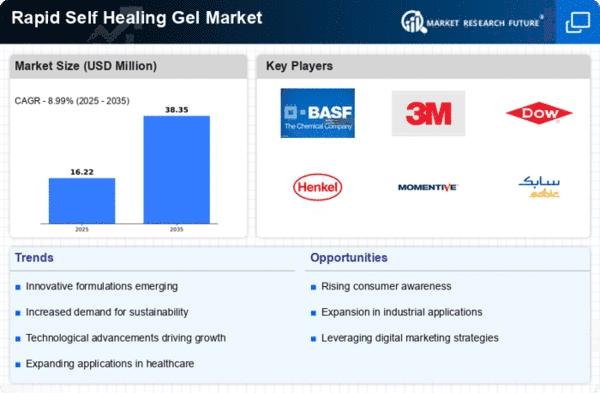Top Industry Leaders in the Rapid Self healing Gel Market

The rapid self-healing gel market is a dynamic arena with fierce competition brewing between established players and innovative startups. Understanding the strategies, factors influencing market share, and recent industry news is crucial for navigating this burgeoning landscape.
Market Share Influencers:
Several factors contribute to a company's market share in this space:
-
Technology and Innovation: Proprietary self-healing mechanisms, biocompatibility, and diverse applications hold the key to attracting and retaining customers. Companies like Medtronic and Lonza are constantly innovating, offering gels with functionalities like self-adhesion and tissue regeneration. -
Regulatory Landscape: Stringent regulations surrounding medical devices and wound care products require stringent compliance, creating an entry barrier for smaller players. Obtaining FDA and CE approvals is essential for market penetration. -
Distribution Channels: Strong partnerships with hospitals, clinics, and pharmaceutical distributors expand reach and brand visibility. Companies like Integra Lifesciences leverage established distribution networks to ensure product accessibility. -
Marketing and Branding: Creating awareness among target audiences, including healthcare professionals and patients, is crucial. Companies like PolyMedics employ targeted marketing campaigns to educate the market about the benefits of their gels.
Strategies Adopted by Players:
To gain an edge, companies are implementing various strategies:
-
Diversification: Expanding product portfolios to cater to diverse applications like wound care, tissue engineering, and drug delivery is a common tactic. Hydrogels, cryogels, and injectable gels are witnessing growing demand. -
Acquisitions and Collaborations: Merging with or collaborating with established players offers access to resources, technology, and market reach. Examples include Smith & Nephew's acquisition of PolyGel and Organogenesis' collaboration with Baxter. -
Focus on Sustainability: Developing eco-friendly and biocompatible gels from natural materials like collagen and hyaluronic acid is gaining traction. Companies like Advanced BioMatrix are leading the charge in this area. -
Personalized Medicine: Tailoring gels to specific patient needs and wound types is a promising trend. Companies like Xogenex are developing gels with customized drug delivery capabilities.
Key Players:
Cardinal Health, Katecho, Scapa Healthcare, Alliqua Biomedical, Advanced Medical Solutions, Axelgaard, Contura, and Hydromer are the major shareholders in the global rapid self-healing gel market.
Recent Developments:
September 2023: Medtronic receives FDA approval for its new injectable gel for minimally invasive surgery, marking a significant step in the field of tissue engineering.
October 2023: A joint study by MIT and Harvard Medical School demonstrates the potential of self-healing gels for regenerating damaged nerves, opening doors for neurological treatment advancements.
December 2023: PolyMedics secures funding for clinical trials of its personalized self-healing gel for diabetic foot ulcers, highlighting the increasing focus on targeted wound care therapies.










